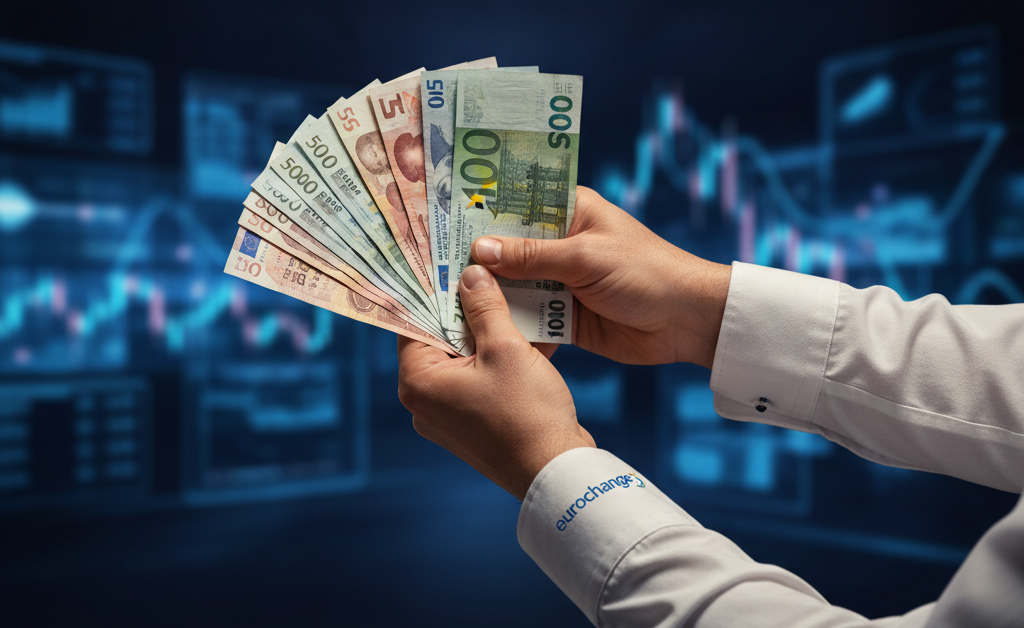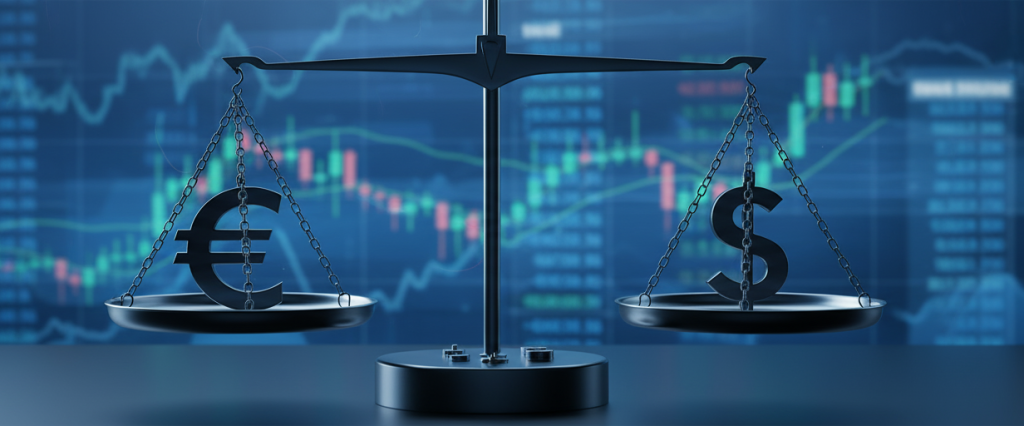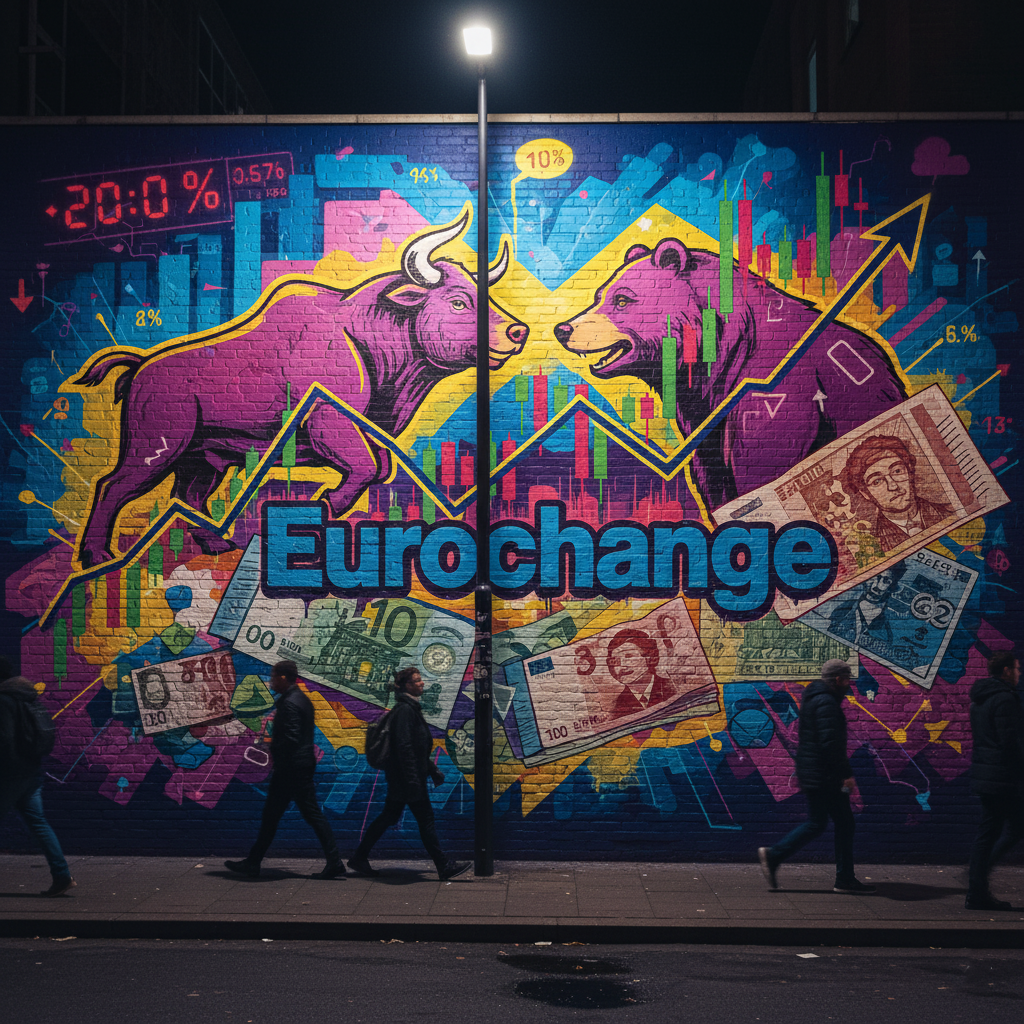Can I buy foreign currencies in Eurochange? >
Yes. Eurochange is fully licensed to sell foreign currency. You can buy your foreign currency at some of our money exchange offices or through our website.
If I’m travelling to Spain, can I exchange my currency into Euros in your exchange offices? >
Yes, you can bring your currency and we will exchange it into Euros. But remember we just can accept notes, not coins.
Should I bring my I.D. to make the exchange? >
Yes. According to current legislation, it is mandatory to present an original and valid (not expired) identity document. We accept Passports or National ID cards (for EU citizens). Remember, if you are a member of the Eurochange Club, the process is faster, but your documentation must be up to date in our system.
Where are the Eurochange exchange offices and what are your opening hours? >
We have Eurochange exchange offices in the main tourist resorts of Alicante, Murcia, Almeria, Málaga and Mallorca. You can check our locations here.
Get to know our opening hours and exact addresses of each office by visiting each area, for example, do you want to know where we are located in Benidorm? Click here
Can I make any kind of exchange in any branch? >
No. Eurochange has two kind of licences: one to buy currency and one to sell curreny. We can buy currency at all our branches, that is, you can exchange your currency to Euros. However, we just can sell foreign currency at some of our branches or through our website. Check our buy and sell service page to see the branches where you can buy foreign currency.
What currencies can I exchange? >
In Eurochange we work with more than 40 different currencies and we are constanley expanding. You can consult our list of currencies for which we currently have available.
What if I want to exchange a currency that is not listed? >
If you need to buy or sell a currency that is not on the list, please contact us and we will confirm the availability.
I have had foreign banknotes for a while now. How I can know if they are legal tender? >
You can come to any our Eurochange exchange offices with the notes and we will confirm whether they are legal tender or no longer in circulation. You can also send a photo by e-mail or by WhatsApp and we will confirm if they are still valid.
Can I exchange banknotes and coins? >
No, in Eurochange we only work with foreign banknotes. We can't accept coins of other currencies. Remember to spend or exchange all coins before your return home.
What is the exchange rate today? >
In Eurochange we update our rates daily of all our currencies. If you want to know the rate you can consult our rates. If you have any questions you can call us and we'll be glad to help.
Do you charge any commissions in exchange operations? >
No, in Eurochange we do not apply commissions. The amount you will receive is directly calculated using the daily exchange rate.
Are your rates better than the bank or the offices at the airport? >
Yes, in Eurochange we offer better rates than the banks and offices at the airports. Also we do not charge commissions. If you're not sure you can compare us, our rates are transparent.
Do you have the same exchange rate in all the offices? >
Yes, in all Eurochange branches will find the same exchange rate updatd daily (but in special promotions that can be set for any branch). You can consult it at any office or on our website.
Do I have the same rate if I buy the currency online than in an exchange office? >
Yes, we have the same rates for all currencies on our website and in our money exchange offices.
How can I make a reservation? >
Choose the currency you want ant the amount in our conversor. You can also place a reservation by e-mail at [email protected] calling us at (0034) 615 403 877 or sending us a WhatsApp message to the same number.
Do I need to make a reservation before going to an exchange office? >
It is not mandatory but is strongly recommended that you make a reservation to ensure we have the amount you want available for the chosen date. If you want to check the availability of any currency you can do so by calling (0034) 615 403 877.
If I reserve my currencies today but I want to collect another day, do you keep the rate? >
The price applied is the rate of the day of collection. If you want to keep the rate of the day you should choose the option BUY (when available). This way you will pay your currency at the moment and you will be able to go to collect at the time that best suits you in any of our exchange offices of collection or to choose the home delivery option and you will receive your order within 24-72 hours depending on the stock.
How long in advanced do I have to reserve my currency? >
Depending on the stock of currencies we have each day, we can cater reservations even for that same day. However, it is best to reserve your currency in advance, at least 2 or 3 days in advance.
Can I make a reservation for the next month? >
Yes, there is no time limit to reserve your currency. If you're traveling in a few weeks and don’t want to worry about the issue, we have no objection at all.
Can I make changes to my reservation (date, name, location, amount,…)? >
Yes. You can make changes on it by sending us an email to [email protected] or by calling (0034) 615 403 877. To the extent possible, we will make the changes you ask us.
Can I cancel my reservation? >
Yes. If you signed up into the site, you can go to your private area and cancel the reservation. If you made the registration without registering, you can cancel it by sending us an email to [email protected] or by calling (0034) 615 403 877.
What is buying currency online? >
At Eurochange you can buy foreign currency online to be delivered at home or to be collected in one of our branches with currency delivery service. You must register online, choose the currency and amount and make the payment. You will recieve you currency between the following 24 -72 hours.
How can I buy my currencies online? >
Use our converter to choose the currency you need and the quantity. Select the BUY option and complete the steps of the purchase process. You will have to register if you are not yet a customer. Go ahead and pay by entering your card details. Once the payment is confirmed, simply complete your customer profile, choose your preferred delivery date and time, and your currency will be available within 24–72 working hours.
Can I make changes or cancel an order paid online? >
Modifications or cancellations of orders must be communicated by phone at (0034) 615 403 877 during our customer service hours, modifications will be made as much as possible as long as the order has not been processed. In that case, no order can be changed or canceled once it has been processed.
Why do I have to send a file with my ID? >
According to the law against money laundering, currency exchange transactions should be identified with the ID. For this reason we ask you to provide us with a readable file with both sides of your ID. It will be only necessary that you send it for the first time for when you make your purchase, then it will be stored on our system.
How can I change my registration details or cancel my account? >
If you want to make any changes on your personal details, delivery address, etc., you can do so on your private area which you will access with your ID number and password. You can also do so by contacting us at [email protected] or (0034) 615 403 877. If you want to cancel your online account, you must contact us.
How can I register for the Newsletter? >
If you want to receive the latest news in your inbox, please fill out the form on the left side of our BLOG to register for our newsletter.
Can I see the history of all of my orders? >
Yes, in your private area you can see a list of all the orders you've made, both online or in our branches.
What forms of payment do you accept if I buy my currency online? >
When you buy currency on our website, you can pay with your credit / debit card or by bank transfer to the account number that we will provide. If you choose the option to pay by transfer, remember that your order may be delayed until we confirm that the transfer has gone through correctly.
What forms of payment do you accept in you exchange offices? >
In all our exchange offices you can pay in cash (remember that we can only accept notes, not coins). Furthermore, in some of our exchange offices you can pay with credit / debit card* Visa, Master Card or Maestro. Visit our card payment service to see where this service is available.
* When you buy Euros you will pay an administration fee of the 2% of the total. Buying foreign currency with any kind of card is free of charge.
Where currency shipments are made? >
This service is available in Spain (penninsula), Balearic Islands, Canary Islands, Ceuta and Melilla.
How long does it take to delivery? >
As a general rule, you will receive your purchased currencies in 24 hours at the address you have given us. In exceptional cases, due to lack of stock, delivery may be delayed no longer than 72 hours after the payment is received. Anyway, you will see the delivery time on the order confirmation view before paying.
How much does it cost to deliver? >
The shipping cost is calculated automatically in the shopping cart based on your postal code. We offer very competitive rates starting from €4.99, for the Peninsula. Remember, if your exchange amount exceeds a certain limit (check current promotions), shipping might be completely FREE! In-store collection is always free of charge.
Can I check the status of my order? >
Yes, you can access to your private area and check the status of all your orders.
Can I pick up the currencies in a Eurochange exchange office? >
Yes, depending on the order that you made (from other currency to Euro or from Euro to other currency) there will be some of our branches available to be chosen.
How can I become a member of Eurochange Club? >
To become a member of our club just go to the nearest Eurochange exchange office with your ID, you will be asked to give us you e-mail address and a contact telephone number and you will receive your card at that very moment.
What are the advantages of becoming a member? >
In addition from benefiting from promotions for members only, you will accumulate points to receive better exchange rates on your transactions. moreover you won't have to bring your ID to exchange money. Your card will be enough.
How can I know how many points do I have? >
If you register on our website, in your private area you will see a list of all operations that have generated points and check out the points balance. The system is updated automatically, but it may take a few minutes to see your last exchange on the list. Contact us if you don't see the exchange listed after 30 minutes.
If you have not registered on the website, you can go to the nearest office or contact us and we will tell your points balance.
If I buy foreign currency, can I return my leftover currency with the same rate? >
Yes. With our Buy Back service you will be able to return up to the 30% of the money you bought with the same rate you paid. Remember that the original purchase must be over 750 Euros to take advantage of this service.
Do you accept damaged, stained, or torn banknotes? >
At Eurochange, we are very strict about the quality of cash to ensure our customers receive banknotes in perfect condition. We exchange what banks don't accept, We exchange all currencies all over the world, obsolete bank notes, exotic bank notes and old bank notes, even broken bank notes. If you have doubts about the condition of your notes, you can send us a photo beforehand or visit a branch for our team to assess them.
Is there a maximum limit on the amount I can exchange? >
Yes. To comply with Anti-Money Laundering regulations, there are certain thresholds. For large amounts (generally over €3,000 or €6,000 depending on the transaction), we may ask for additional documentation to prove the source of funds (payslip, professional activity, etc.). For standard tourist transactions, a valid Passport/ID is sufficient up to the established legal limit.
Can I pay with my mobile phone (Apple Pay, Google Pay) at the branches? >
Yes, in those branches equipped with a card payment terminal (POS), we accept contactless payments via mobile devices such as smartphones or smartwatches, provided they are linked to an accepted card (Visa or MasterCard).
What if I need specific banknotes? >
Sometimes you might need specific banknotes. For example, in some Asian or South American countries, it’s recommended to carry US dollars in perfect condition and from certain years of issue. If you have any special requests regarding the banknotes you need, please contact us and explain your requirements. We’ll do our best to prepare your order accordingly.
What if I’m not home when my order is delivered? >
Eurochange shipments are delivered to the address provided. If you’re not home, the courier will leave a notice or send an SMS to arrange a new delivery. You can also request that the package be sent to the nearest courier office so you can pick it up yourself.
Is it better to carry cash or pay by card abroad? >
There’s no one-size-fits-all answer. In cities like New York, cards are widely accepted, but in places like Vietnam, cash is often essential. We recommend carrying at least part of your budget in cash—you’ll know exactly what you’re spending and avoid hidden bank fees. Use your card as a backup, and always check your bank’s exchange rates and commission policies before you travel.
Who can receive a currency order? >
For security reasons, home deliveries are only made to the person who placed the order. If you authorize someone else during checkout, the package will be addressed to that person and only they can receive it. If you need to authorize multiple recipients or add special delivery instructions, please contact us.
Can I send or receive international money transfers? >
Yes, thanks to our partnership with Western Union, you can send money to over 200 countries or receive it within minutes securely at our branches. You only need your valid ID and the recipient's details.
Do you offer Tax Free refunds for tourists? >
Yes, we manage Tax Free cheque cashing. We work with major operators (such as Planet, Global Blue, etc.) so you can claim your tax refund before leaving the EU. Please check with your nearest branch for service availability.
Can I reserve my currency via WhatsApp? >
Sure! It's the fastest way. Message us at (+34) 615 403 877 indicating the currency you need, the amount, and the branch where you want to collect it. We will confirm availability instantly.










